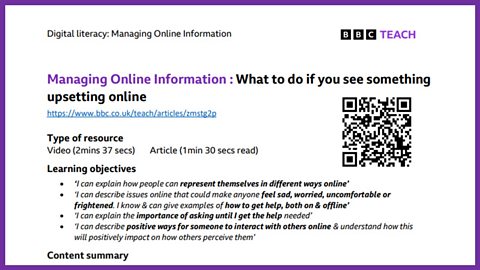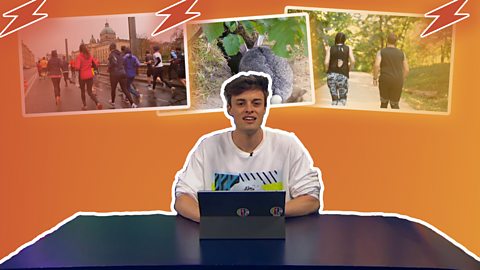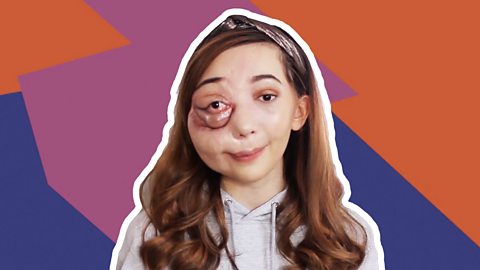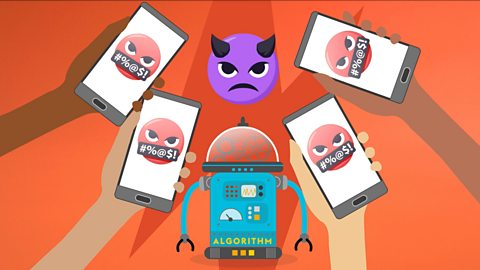Video summary
Jamie Campbell explains the importance of talking to someone, and how it makes you feel better. He says it will be awkward for students to talk with parents about a weird video students they may have seen online, but it's important to remember that staying quiet may makes things worse. Starting a conversation with a trusted adult will enable them to guide you through it.
Top tips and advice on what to do if you see something upsetting online
Often things can just pop up on your phone without warning. If something online has upset, worried or scared you, donãt panic, there are things you can do.
1. Remember you are in control
If you see something you donãt like, donãt click on it. If it pops up when youãre watching a video, close it down. If you are sent a nasty message or a challenge online, delete it.
2. Block and report it
If you see upsetting content online, block the user it came from, and report them on the platform you are using. An adult can help if youãre not sure how to do this.
3. Don't pass it on
This is how horrible challenges or messages are spread around. If what youãve seen makes you feel worried or unhappy - donãt send it on to others.
4. Check device and privacy settings
Make sure your device and privacy settings are correctly set up. Donãt accept friends you donãt know in real life, and never give out personal information such as your location.
5. It's not real
Challenge videos saying that bad stuff will happen if you donãt complete certain tasks, can be really scary. They are NOT real. Donãt take part. Even with ãfunã challenges that arenãt going to cause you harm ã you donãt have to do them. Never feel like you have to do anything you donãt want to do.
6. Tell an adult
Talking through anything thatãs distressing you with someone you trust, such as a teacher or a parent, can really help.
7. Further help
If youãre worried about anything youãve seen when using the internet or apps you can contact Childline 24 hours a day, online and over the phone on 0800 1111.
Video: 1min 36 secs
Article: 1min read
Learning objectives
(from the set out by the UK Council for Internet Safety)
ãI can explain how people can represent themselves in different ways onlineã
ãI can describe issues online that could make anyone feel sad, worried, uncomfortable or frightened. I know & can give examples of how to get help, both on & offlineã
ãI can explain the importance of asking until I get the help neededã
ãI can describe positive ways for someone to interact with others online & understand how this will positively impact on how others perceive themã
Glossary
- Challenge video: a type of online video posted on social media that challenges you to carry out specific tasks
- Block: to cut off online communication with someone: they cannot contact you or see your posts and you canãt see theirs
- Digital Platform: a digital service that provides an online place or system with tools and apps
- Content: the material that people put online ã including video, text, image, animation, sound
- Device: a machine designed and built to carry out specific tasks ã often used to mean electronic or digital device
- Privacy Settings: the settings on an app or platform that control who can contact you, see your profile and posts, tag you etc
Topic introductions and starters
Before the video:
- Ask pupils to write down their current understanding of the key phrases & words from the glossary
After the video:
Check new understanding of the key vocabulary & correct any misconceptions ã note any other non-technical words that might need clarification and make a class glossary
Rewatch the video and note down the main points raised using a note taking grid with the headings from the article
Discussion Points
- Does horrible stuff sometimes get more likes online?ã
To get attentionãÎto get likesãÎto make them look coolãÎ
- Is it better to post positive things that are fun and make people look good?
But horrible stuff gets more likesãÎ
- Have you ever heard of anything actually happening to someone as a result of not doing an online challenge?
Donãt believe rumoursãÎpeople only say this kind of thing to get attentionãÎ you can check to see if it is a hoax onlineãÎ
Should you feel bad about blocking someone? Blocking them takes away their control and gives it back to youãÎ**
Why is it a good idea to speak to a trusted adult when youãre upset by something online? Itãs better to ask for adult help before things get out of handãÎtry explaining that you didnãt look for this stuff on purposeãÎ**
Roleplay
- In pairs or small groups try giving advice to a friend who has seen something upsetting. Use the article heading cards as prompts for the conversation
Fillers and fast finisher activities
- Create illustrations for the 7 heading cards used in the article ã use pencil and paper or digital media tools
- Use the glossary words and other relevant vocabulary to make a wordsearch using a blank wordsearch template
- Write a version of the article for younger children and/or for parents/older family members, changing the tone, vocabulary and image style to style to suit the different the different audiences
Signposting potential homework activities
- Share the video with friends & family & discuss any experiences they have had with the issues raised.
- Create a crossword using the glossary words and any others to share with classmates back in school
- Write a song or poem using the heading titles as the first line of each verse
For download/printing

If your students need support
You should always tell someone about the things youãre worried about. You can tell a friend, parent, guardian, teacher, or another trusted adult. If you're struggling with your mental health, going to your GP can be a good place to start to find help. Your GP can let you know what support is available to you, suggest different types of treatment and offer regular check-ups to see how youãre doing.
If youãre in need of in-the-moment support you can contact , where you can speak to a counsellor. Their lines are open 24 hours a day, 7 days a week.
More on: Managing online information
Binge watching. video
Joe Tasker explains how you can get things back on track if you find yourself binge watching videos online.

Nikki Lilly - Having a positive impact. video
Vlogger Nikki Lilly talks about the best and worst aspects of life online - and how she uses the internet for good.

Why does the internet behave badly? video
A video exploring how algorithms work, and how to counter seeing nasty comments online.
